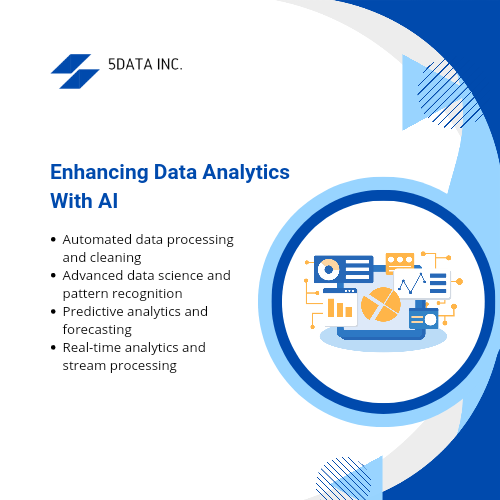The rapid advancements in artificial intelligence (AI) have brought about a significant transformation in various industries. The most remarkable impact of AI in Data Analytics is enabling more accurate and efficient analysis of vast amounts of data and providing valuable insights for decision-making processes.
In this digital era, business processes are inundated with huge amounts of data, and effectively harnessing this data has become critical for success. AI-powered cloud computing tools and algorithms have revolutionized the field of data analytics, reshaping market dynamics and impacting sectors such as high-frequency stock trading while enhancing customer experience to make it more pleasurable.
This article delves into the transformative impact of AI in data analytics and decision-making process. It explores the benefits and challenges that AI brings to these domains and the potential future developments that can be expected.
5Data Inc. is an Artificial Intelligence service provider offering expert assistance in data management, implementing best practices to optimize data science. Leverage their expertise in data analytics to unlock valuable insights from your data efficiently and effectively.
What we cover in this blog
How Does AI Help In Decision Making?
1. Enhancing data analytics with artificial intelligence
- Automated data processing and cleaning: AI algorithms have streamlined the data preprocessing phase, minimizing reliance on human intelligence and mitigating potential errors. These algorithms can automatically identify and rectify data quality issues, ensuring cleaner and more reliable data for analysis. Furthermore, AI in data analytics facilitates efficient data integration and transformation, enabling organizations to consolidate and harmonize data collection from disparate data sources.
- Advanced-data science and pattern recognition: AI and machine learning algorithms excel in identifying patterns and multiple relationships within complex machine learning. The classification and regression algorithms enable organizations to predict outcomes and make data-driven decisions.Unsupervised learning techniques, such as clustering and anomaly detection, provide valuable insights into hidden patterns and anomalies within data. Natural language processing (NLP) algorithms enable text and sentiment analysis, opening doors for valuable insights from unstructured data sources.
- Predictive analytics and forecasting: Artificial Intelligence AI systems enhance data science capabilities, enabling organizations to forecast future trends and outcomes. Through machine learning algorithms, predictive models can analyze historical data to identify patterns and make accurate predictions. Time-series analysis techniques and AI machine learning models enable organizations to forecast demand, optimize inventory, and make relevant decisions based on anticipated changes. As one of the world’s top Data Integration Service Providers, 5Data Inc. excels in expert analytics and offers comprehensive Data Lifecycle Management Services. Partner with them to make informed decisions, drive business growth, and gain a competitive edge in the industry.
- Real-time analytics and stream processing: AI-driven tools enable organizations to process and analyze streaming data elements in real-time. It empowers modern business functions to make decisions and enhance operational efficiency and competitiveness. Real-time data visualization and monitoring dashboards enable stakeholders to gain immediate insights into key performance indicators and take prompt actions as needed.

2. AI-driven Decision Making
- Augmented decision making: Artificial Intelligence empowers decision-makers by providing intelligent decision support systems. These systems leverage machine learning algorithms to analyze data, identify trends, and generate valuable insights. By automating routine and repetitive tasks, AI reduces the cognitive load on decision-makers, enabling them to focus on higher-level strategic decisions.
- Risk assessment and mitigation: AI models pivotal in risk assessment and mitigation strategies. Artificial Intelligence algorithms can detect potential risks and threats by analyzing historical data and identifying patterns. Organizations can automate risk management processes, enabling proactive measures to minimize risks. AI-automated systems can assess the probability and impact of risks, facilitating data-driven decision-making to mitigate potential losses.Accurate decision-making in chaotic situations, where causes and effects are unclear and dynamic interdependencies exist, necessitates practical learning and experimentation. Even minor changes can lead to unpredictable impacts, as seen in natural disasters or stock market crashes. Therefore, adopting a practical approach that involves continuous learning and hands-on experimentation becomes crucial for making financial reports.
- Personalization and customer analytics: Artificial Intelligence algorithms enable business processes to personalize customer experiences and drive customer-centric strategies. Recommendation systems leverage AI in Data Analytics to predict customer behavior and preferences, offering personalized recommendations and improving customer satisfaction. AI-based customer segmentation allows organizations to target specific customer segments with tailored marketing efforts, campaigns, and promotions, maximizing customer engagement and revenue generation.
- Ethical considerations in decision making: AI decision-making systems must address ethical considerations to ensure fairness and avoid biases. Organizations must address algorithmic bias, transparency, and accountability issues. Ethical frameworks can guide the development and deployment of AI applications, ensuring responsible decision-making. By incorporating ethical considerations, organizations can build trust among stakeholders and ensure the ethical use of AI technologies.
3. Challenges and Future Directions
- Data privacy and security: Comprehensive Big Data Solutions make safeguarding sensitive data in AI-driven prescriptive or predictive analytics paramount. Establishing robust measures such as encryption, access controls, secure data storage, and cybersecurity protocols is essential to protect against unauthorized access, breaches, and misuse. The big data solution ensures data privacy and security, enabling you to leverage AI’s potential for analysis and decision-making while maintaining the integrity and confidentiality of your valuable data.
- Skill gaps and workforce readiness: Acquire artificial intelligence skills for effective decision-making. To leverage the potential of AI in decision-making, organizations need to bridge the skill gaps by training their workforce in AI technologies, data science, and interpretation. Developing a professional AI skillset among decision-makers enables them to analyze AI outputs and make informed decisions effectively.
- Interpreting AI outputs and transparency: AI outputs may not always be straightforward. Organizations must invest in understanding data-driven insights and developing the ability to extract valuable information from AI models. It includes enhancing AI algorithms’ interpretability and transparency to comprehend the rationale behind their decisions.
- Human-AI collaboration and trust: Foster collaboration between human decision-making and AI systems. Effective decision-making involves a collaboration between human knowledge and automated AI. Organizations should encourage interaction, communication, and cooperation between AI tools and decision-makers. Humans can provide contextual knowledge, ethical considerations, and critical thinking, while AI can offer customer data analysis, pattern recognition, and computer vision.
- Build trust in AI-powered analytics and decision-making: Trust is essential for the widespread adoption of AI in decision-making. Organizations must ensure AI processes’ transparency, explain the decision-making rationale, and address biases or limitations. Establishing trust involves demonstrating reliability, accountability, and ethical use of AI, fostering confidence in the technology’s capabilities. Data scientists and consulting companies extensively leverage AI/ML solutions to assist retail sector leaders in achieving business intelligence transformation and unlocking the true value through actionable insights.
Impact Of AI In The Future
AI is positioned to bring a transformative influence across numerous facets of our lives. It will drive automation and boost efficiency and productivity spanning industries. In healthcare, AI has the potential to facilitate personalized medicine, aid in diagnosis, and expedite drug discovery. Transportation will witness self-driving cars and autonomous vehicles revolutionizing mobility and enhancing safety. AI Consulting Services Companies like 5Data Inc. can elevate personalized experiences through AI-driven recommendations and tailored learning. By harnessing AI’s potential, they optimize energy consumption and asset management and address ethical considerations of transparency, fairness, and privacy. Contact us and enhance your business’s performance while prioritizing sustainability and ethical AI practices.
Rasmita Patro
Author
